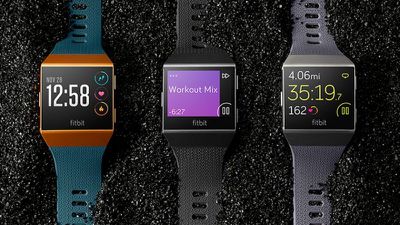Fitbit Announces Deal to Bring Glucose Monitoring Data to its Ionic Smartwatch
Fitbit has announced a new partnership with glucose monitoring device company Dexcom that is set to bring diabetes monitoring capabilities to the fitness tracker company's new Ionic smartwatch.
The deal initially means Ionic users will be able to connect a Dexcom device to the Fitbit app and seamlessly transfer up-to-date glucose level data to the smartwatch, making the information more easily accessible on their wrist.

"The collaboration between Dexcom and Fitbit is an important step in providing useful information to people with diabetes that is both convenient and discreet," said Kevin Sayer, President and CEO, Dexcom. "We believe that providing Dexcom CGM data on Fitbit Ionic, and making that experience available to users of both Android and iOS devices, will have a positive impact on the way people manage their diabetes."
There's nothing in the partnership to suggest the Ionic smartwatch will be able to give continuous glucose monitoring readouts on its own when it's released next month – current continuous glucose monitoring systems require a small sensor that's worn under the skin to monitor glucose levels – but Fitbit shares jumped 13 percent on the news, a high for the company since January, when it laid off some of its employees and announced its smartwatch plans.
Dexcom also has a deal with Apple to bring its features to the Apple Watch this year, while owners of Dexcom monitors can already view their glucose data on an Apple Watch – advanced devices by Dexcom include a transmitter, which can display glucose information directly to an iPhone app.
Apple is thought to be working on a non-invasive real-time glucose monitor for a future version of Apple Watch. In April, a CNBC report suggested Apple had a team of biomedical engineers working to develop sensors for non-invasively monitoring blood glucose, with work on the sensors far enough along that the company had started conducting feasibility trials.
Apple CEO Tim Cook was reportedly spotted in May testing a prototype glucose monitor that's connected to his Apple Watch. Cook, who is said to be aiming to understand how his blood sugar is affected by food and exercise, has been seen wearing the device around the Apple Campus.
Popular Stories
Apple will launch its new iPhone 17 series in two months, and the iPhone 17 Pro models are expected to get a new design for the rear casing and the camera area. But more significant changes to the lineup are not expected until next year, when the iPhone 18 models arrive.
If you're thinking of trading in your iPhone for this year's latest, consider the following features rumored to be coming...
In select U.S. states, residents can add their driver's license or state ID to the Wallet app on the iPhone and Apple Watch, providing a convenient and contactless way to display proof of identity or age at select airports and businesses, and in select apps.
Unfortunately, this feature continues to roll out very slowly since it was announced in 2021, with only nine U.S. states, Puerto Rico,...
Since the iPhone X in 2017, all of Apple's highest-end iPhone models have featured either stainless steel or titanium frames, but it has now been rumored that this design decision will be coming to an end with the iPhone 17 Pro models later this year.
In a post on Chinese social media platform Weibo today, the account Instant Digital said that the iPhone 17 Pro models will have an aluminum...
Three out of four iPhone 17 models will feature more RAM than the equivalent iPhone 16 models, according to a new leak that aligns with previous rumors.
The all-new iPhone 17 Air, the iPhone 17 Pro, and the iPhone 17 Pro Max will each be equipped with 12GB of RAM, according to Fixed Focus Digital, an account with more than two million followers on Chinese social media platform Weibo. The...
Apple is expanding the ability to add an Apple Account Card to the Wallet app to more countries, according to backend Apple Pay changes.
With iOS 15.5, Apple updated the Wallet app to allow users to add an Apple Account Card, which displays the Apple credit balance associated with an Apple ID.
If you receive an Apple gift card, for example, it is added to an Apple Account that is also...
Apple does not plan to refresh any Macs with updated M5 chips in 2025, according to Bloomberg's Mark Gurman. Updated MacBook Air and MacBook Pro models are now planned for the first half of 2026.
Gurman previously said that Apple would debut the M5 MacBook Pro models in late 2025, but his newest report suggests that Apple is "considering" pushing them back to 2026. Apple is now said to be...
Apple is continuing to refine and update iOS 26, and beta three features smaller changes than we saw in beta 2, plus further tweaks to the Liquid Glass design. Apple is gearing up for the next phase of beta testing, and the company has promised that a public beta is set to come out in July.
Transparency
In some apps like Apple Music, Podcasts, and the App Store, Apple has toned down the...
If you pay for iCloud storage on your iPhone, did you know that Apple offers you five perks beyond the extra storage space, at no additional cost?
Here are the perks included with all iCloud+ plans:Private Relay keeps your Safari browsing history entirely private from network providers, websites, and even Apple.
Hide My Email generates unique, random email addresses whenever needed.
Hom...
![]()



















